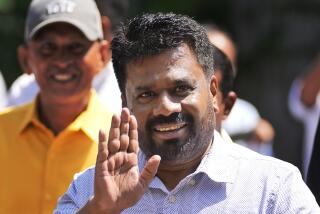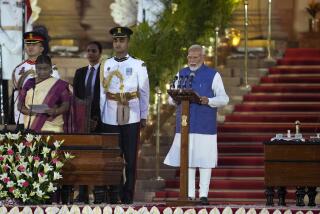Hindu Coalition Wins Indian Vote
- Share via
NEW DELHI — Hindu nationalists rode to victory Thursday in countrywide elections, leading a far-flung collection of parties with a promise to end the instability that has dogged Indian politics in recent years.
Prime Minister Atal Behari Vajpayee and his 22-party coalition captured a comfortable majority in Parliament, possibly enough to give his new government a chance to serve out its full five-year term--something the past four governments were unable to do.
Vajpayee and his allies crushed the rival Congress Party, once India’s dominant political force. Congress’ standard-bearer, the Italian-born Sonia Gandhi, managed to capture a seat in Parliament, but the party is headed toward its worst defeat. The last of the 300 million-plus votes cast in the election will be counted today.
Gandhi, whose foreign birth became a major election issue, acknowledged defeat Thursday even as the party’s leaders affirmed their support. The candidate, who is the widow of former Prime Minister Rajiv Gandhi, attracted the largest share of the attention during the campaign but, in the end, not enough votes.
“We accept unhesitatingly the verdict of the people,” Gandhi said. “The result calls for introspection, frank assessment and determined action.”
Vajpayee’s Bharatiya Janata Party returns to power after a listless campaign that featured little debate about the nation’s pressing problems. Reform of the antiquated economic system, poverty and alleviation of illiteracy seldom surfaced as issues.
Among the priorities of Vajpayee’s government will be a resumption of talks with longtime foe Pakistan, with which India fought a border war this summer--and speeding up free-market reforms. Signaling their approval of the BJP’s triumph, investors Thursday pushed the Bombay stock market to its highest level.
The BJP government came to power in March 1998 and stunned the world with five underground atomic explosions that May and a declaration that India was the world’s newest nuclear power. After that, its leaders spent much of the next year fending off threats from coalition partners threatening to withdraw their support. One finally made good on its promise, and the government fell in April after just 13 months.
This time, the party rode to victory on the popularity of Vajpayee, a respected figure in Indian politics whose stature rose even more in the wake of the fighting with Pakistan.
On Thursday, the BJP’s leaders predicted that they will do a better job in government this time around.
Although it appears that the coalition will have at least 288 seats in Parliament, 16 more than it needs for a majority, many political analysts predict that it will fare little better than the previous government. Despite the fact that it is the single largest party in Parliament, the BJP does not appear likely to pick up any more seats. This coalition has more parties than the previous one.
The election results continue a decade-old trend in Indian politics, which were dominated for 40 years by the Congress Party. The Congress, featuring the dynasty of Nehru, daughter Indira Gandhi and her son, Rajiv, began losing its grip in the late 1980s. Since then, Indian voters have fled to an array of other groups, including the BJP and parties centered on region and caste. Instability has accompanied the diffusion of power.
Savita Ahuja, a New Delhi schoolteacher, stared up at a large government billboard Thursday as it flashed the election returns.
“It’s a sad situation that there is no single party capable of forming a government,” Ahuja said. “The main issues like education, unemployment, water, electricity will not be taken up as the parties in the government will be fighting to get more mileage.”
For all the uncertainty, some people here are predicting that Vajpayee could try to strike a deal with Pakistan, with which India has fought three wars since 1947. Recent reports have suggested that Vajpayee was working toward just such a deal this year when fighting in the Himalayas scuttled back-channel peace talks.
*
Amitabh Sharma of The Times’ New Delhi Bureau contributed to this report.
More to Read
Sign up for Essential California
The most important California stories and recommendations in your inbox every morning.
You may occasionally receive promotional content from the Los Angeles Times.













